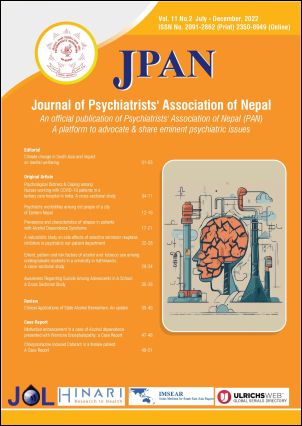Psychological Distress & Coping among Nurses working with COVID-19 patients in a tertiary care hospital in India: A cross-sectional study.
DOI:
https://doi.org/10.3126/jpan.v11i2.57626Keywords:
COVID-19, nursing coping, psychological distressAbstract
Objective: This study aimed to understand the psychological impact of COVID-19 pandemic on Indian nursing professionals and their strategies of coping with it.
Method: This was a cross-sectional observational study conducted on nursing professionals (staff and students) of a tertiary care hospital, medical college and research centre in North India.
Results: Among 103 participants, most participants were females (84.5%), graduates, married and lived with families. Most participants and their families responded to COVID duty with anxiety, fear and stress. Physical discomfort and inadequate PPE supply were main challenges perceived while working. Depressive symptoms were seen in 41% participants, 55% reported anxiety and 35% reported clinically significant stress. Participants working in COVID duty reported significantly higher anxiety compared to those who were not. Those with positive personal and family reactions towards COVID duties reported lower anxiety and stress scores. Those who perceived work-related discrimination had higher depression, anxiety and stress scores. Majority of participants employed approach-based coping styles with acceptance as the most commonly used coping strategy. Acceptance and planning were significantly higher in participants who had done COVID-19 duties compared to those who had not.
Conclusion: Understanding adverse psychological impact of COVID-19 on nursing professionals is of utmost importance as it has a direct bearing on patient care. Efforts for promoting comfort in work environment, psychological, familial and social support and activities promoting healthy coping are recommended during challenging times.
Downloads
Downloads
Published
How to Cite
Issue
Section
License

This work is licensed under a Creative Commons Attribution 4.0 International License.
This license enables reusers to distribute, remix, adapt, and build upon the material in any medium or format, so long as attribution is given to the creator. The license allows for commercial use.




